ACCT6007 Financial Accounting: AI and Blockchain Critical Review
VerifiedAdded on 2023/06/12
|9
|2181
|450
Essay
AI Summary
This essay critically analyzes the impact of artificial intelligence (AI) and blockchain technology on the accounting profession, focusing on their potential to streamline data analysis, improve audit quality, and reshape the role of accountants. It examines how AI assists auditors in processing large data volumes and making predictions, while blockchain enhances transparency and accuracy in accounting transactions. The report argues that these technologies are not eliminating accountants but rather restructuring their roles, requiring them to adapt and develop new skills in data analysis, strategic insight, and client advising. Furthermore, it discusses other technologies like cloud computing that are transforming accounting practices by increasing productivity, cost-effectiveness, and the need for forward-looking strategies. The analysis emphasizes the importance of quality data and careful implementation for successful adoption of AI and blockchain in accounting, highlighting the need for accountants to remain updated with technological advancements and be prepared for evolving challenges and opportunities.

Financial accounting theory and
practices
practices
Paraphrase This Document
Need a fresh take? Get an instant paraphrase of this document with our AI Paraphraser
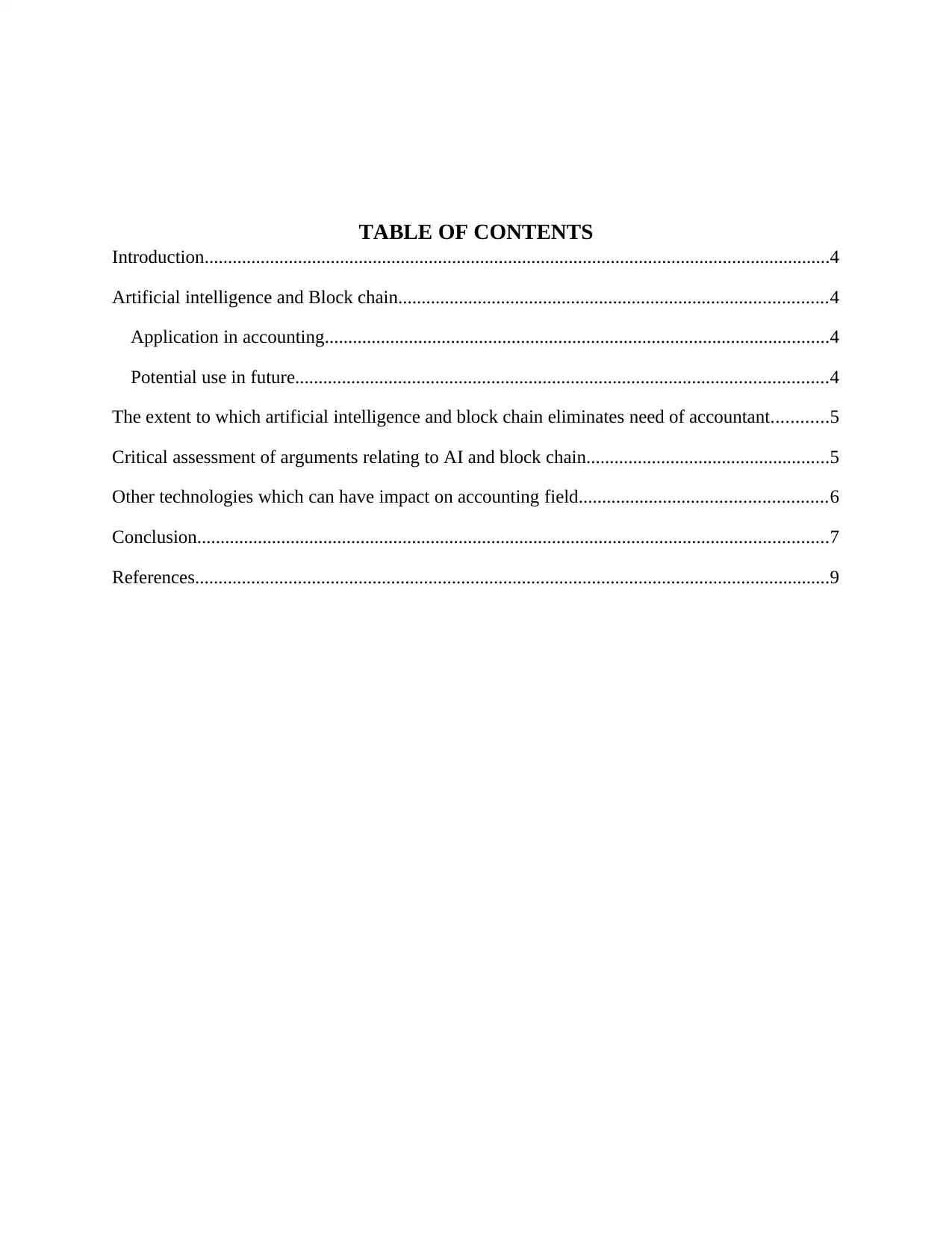
TABLE OF CONTENTS
Introduction......................................................................................................................................4
Artificial intelligence and Block chain............................................................................................4
Application in accounting............................................................................................................4
Potential use in future..................................................................................................................4
The extent to which artificial intelligence and block chain eliminates need of accountant............5
Critical assessment of arguments relating to AI and block chain....................................................5
Other technologies which can have impact on accounting field.....................................................6
Conclusion.......................................................................................................................................7
References........................................................................................................................................9
Introduction......................................................................................................................................4
Artificial intelligence and Block chain............................................................................................4
Application in accounting............................................................................................................4
Potential use in future..................................................................................................................4
The extent to which artificial intelligence and block chain eliminates need of accountant............5
Critical assessment of arguments relating to AI and block chain....................................................5
Other technologies which can have impact on accounting field.....................................................6
Conclusion.......................................................................................................................................7
References........................................................................................................................................9

Table of Figure
Figure 1: Concern of accounting profession relating to cloud software..........................................7
Figure 1: Concern of accounting profession relating to cloud software..........................................7
⊘ This is a preview!⊘
Do you want full access?
Subscribe today to unlock all pages.

Trusted by 1+ million students worldwide
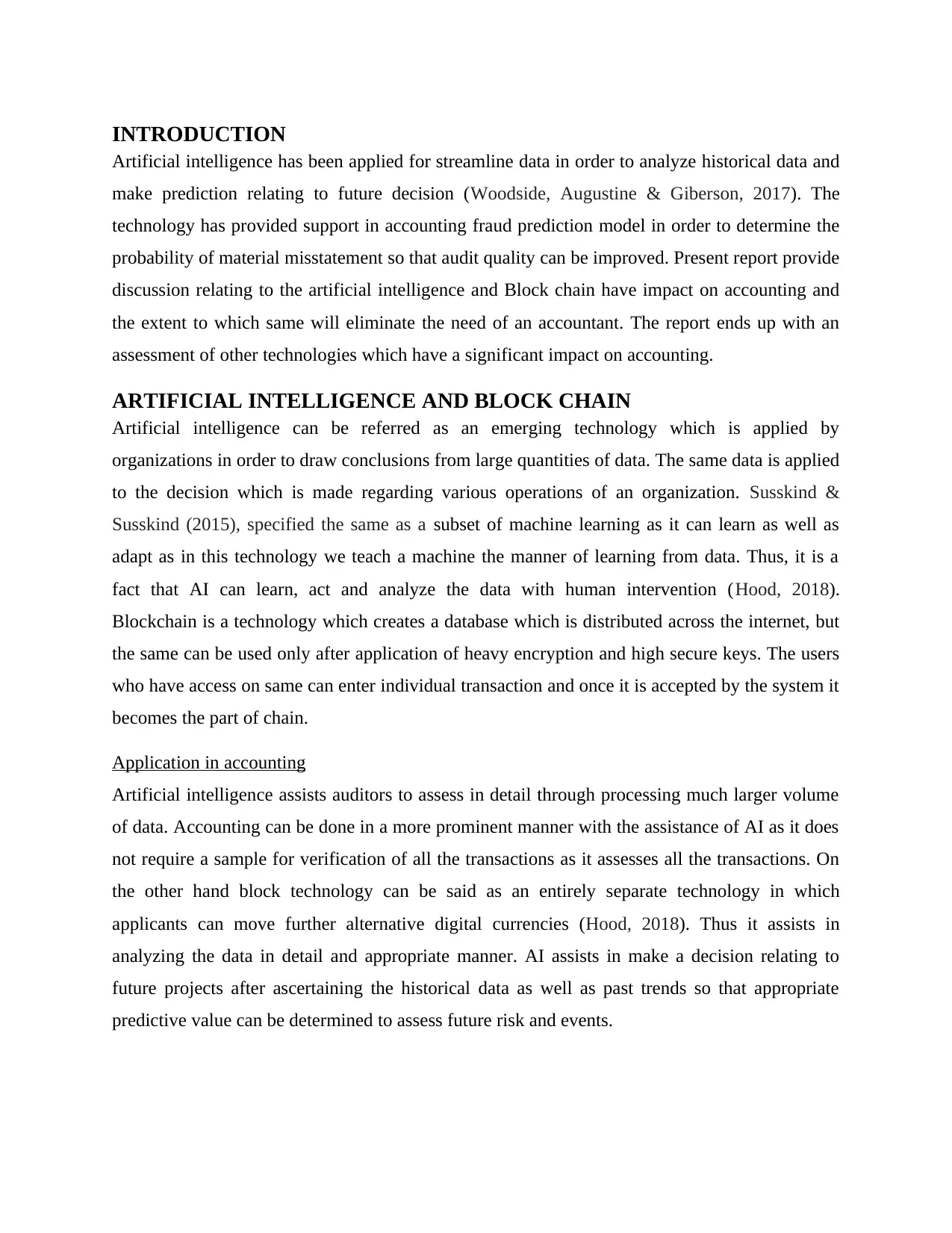
INTRODUCTION
Artificial intelligence has been applied for streamline data in order to analyze historical data and
make prediction relating to future decision (Woodside, Augustine & Giberson, 2017). The
technology has provided support in accounting fraud prediction model in order to determine the
probability of material misstatement so that audit quality can be improved. Present report provide
discussion relating to the artificial intelligence and Block chain have impact on accounting and
the extent to which same will eliminate the need of an accountant. The report ends up with an
assessment of other technologies which have a significant impact on accounting.
ARTIFICIAL INTELLIGENCE AND BLOCK CHAIN
Artificial intelligence can be referred as an emerging technology which is applied by
organizations in order to draw conclusions from large quantities of data. The same data is applied
to the decision which is made regarding various operations of an organization. Susskind &
Susskind (2015), specified the same as a subset of machine learning as it can learn as well as
adapt as in this technology we teach a machine the manner of learning from data. Thus, it is a
fact that AI can learn, act and analyze the data with human intervention (Hood, 2018).
Blockchain is a technology which creates a database which is distributed across the internet, but
the same can be used only after application of heavy encryption and high secure keys. The users
who have access on same can enter individual transaction and once it is accepted by the system it
becomes the part of chain.
Application in accounting
Artificial intelligence assists auditors to assess in detail through processing much larger volume
of data. Accounting can be done in a more prominent manner with the assistance of AI as it does
not require a sample for verification of all the transactions as it assesses all the transactions. On
the other hand block technology can be said as an entirely separate technology in which
applicants can move further alternative digital currencies (Hood, 2018). Thus it assists in
analyzing the data in detail and appropriate manner. AI assists in make a decision relating to
future projects after ascertaining the historical data as well as past trends so that appropriate
predictive value can be determined to assess future risk and events.
Artificial intelligence has been applied for streamline data in order to analyze historical data and
make prediction relating to future decision (Woodside, Augustine & Giberson, 2017). The
technology has provided support in accounting fraud prediction model in order to determine the
probability of material misstatement so that audit quality can be improved. Present report provide
discussion relating to the artificial intelligence and Block chain have impact on accounting and
the extent to which same will eliminate the need of an accountant. The report ends up with an
assessment of other technologies which have a significant impact on accounting.
ARTIFICIAL INTELLIGENCE AND BLOCK CHAIN
Artificial intelligence can be referred as an emerging technology which is applied by
organizations in order to draw conclusions from large quantities of data. The same data is applied
to the decision which is made regarding various operations of an organization. Susskind &
Susskind (2015), specified the same as a subset of machine learning as it can learn as well as
adapt as in this technology we teach a machine the manner of learning from data. Thus, it is a
fact that AI can learn, act and analyze the data with human intervention (Hood, 2018).
Blockchain is a technology which creates a database which is distributed across the internet, but
the same can be used only after application of heavy encryption and high secure keys. The users
who have access on same can enter individual transaction and once it is accepted by the system it
becomes the part of chain.
Application in accounting
Artificial intelligence assists auditors to assess in detail through processing much larger volume
of data. Accounting can be done in a more prominent manner with the assistance of AI as it does
not require a sample for verification of all the transactions as it assesses all the transactions. On
the other hand block technology can be said as an entirely separate technology in which
applicants can move further alternative digital currencies (Hood, 2018). Thus it assists in
analyzing the data in detail and appropriate manner. AI assists in make a decision relating to
future projects after ascertaining the historical data as well as past trends so that appropriate
predictive value can be determined to assess future risk and events.
Paraphrase This Document
Need a fresh take? Get an instant paraphrase of this document with our AI Paraphraser
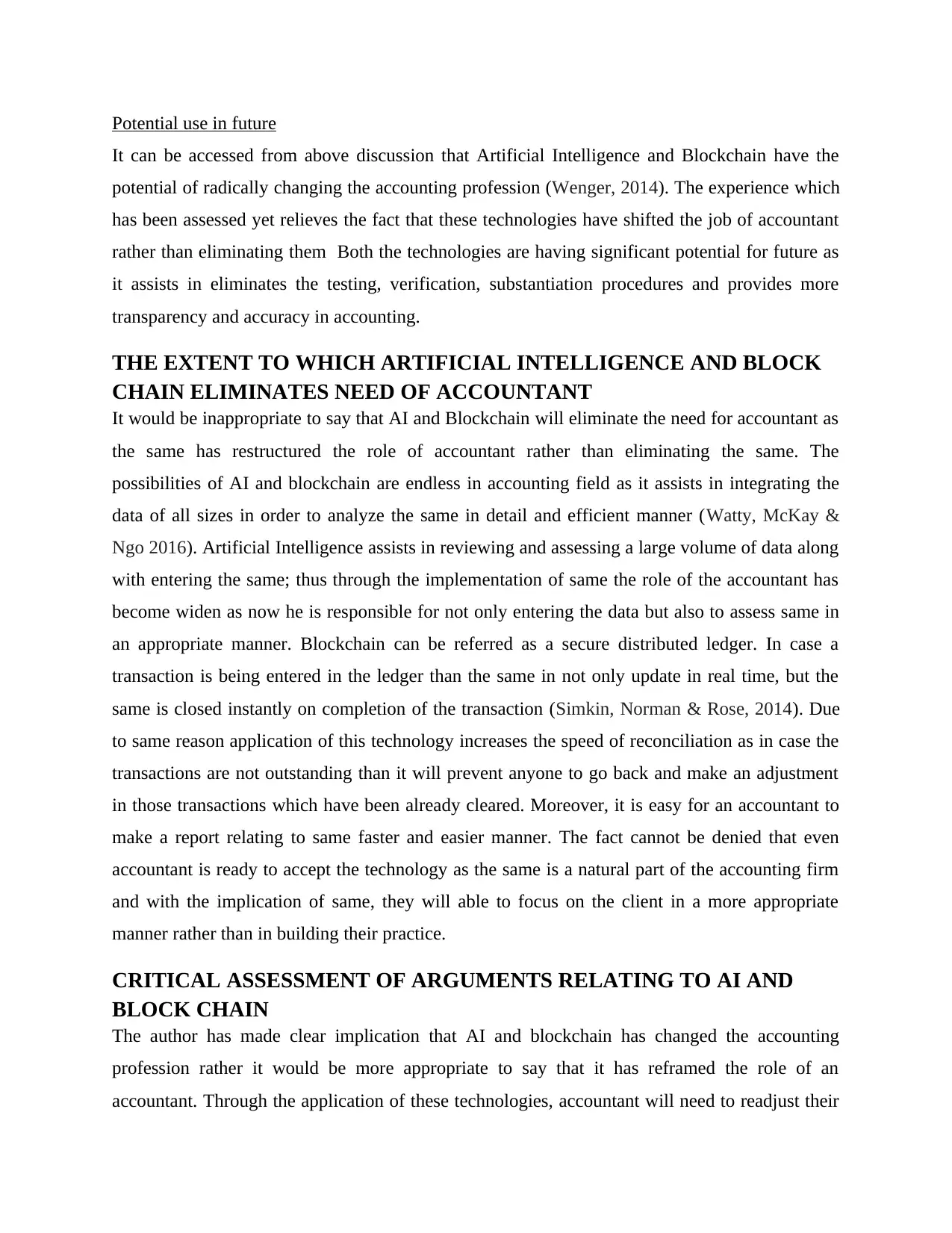
Potential use in future
It can be accessed from above discussion that Artificial Intelligence and Blockchain have the
potential of radically changing the accounting profession (Wenger, 2014). The experience which
has been assessed yet relieves the fact that these technologies have shifted the job of accountant
rather than eliminating them Both the technologies are having significant potential for future as
it assists in eliminates the testing, verification, substantiation procedures and provides more
transparency and accuracy in accounting.
THE EXTENT TO WHICH ARTIFICIAL INTELLIGENCE AND BLOCK
CHAIN ELIMINATES NEED OF ACCOUNTANT
It would be inappropriate to say that AI and Blockchain will eliminate the need for accountant as
the same has restructured the role of accountant rather than eliminating the same. The
possibilities of AI and blockchain are endless in accounting field as it assists in integrating the
data of all sizes in order to analyze the same in detail and efficient manner (Watty, McKay &
Ngo 2016). Artificial Intelligence assists in reviewing and assessing a large volume of data along
with entering the same; thus through the implementation of same the role of the accountant has
become widen as now he is responsible for not only entering the data but also to assess same in
an appropriate manner. Blockchain can be referred as a secure distributed ledger. In case a
transaction is being entered in the ledger than the same in not only update in real time, but the
same is closed instantly on completion of the transaction (Simkin, Norman & Rose, 2014). Due
to same reason application of this technology increases the speed of reconciliation as in case the
transactions are not outstanding than it will prevent anyone to go back and make an adjustment
in those transactions which have been already cleared. Moreover, it is easy for an accountant to
make a report relating to same faster and easier manner. The fact cannot be denied that even
accountant is ready to accept the technology as the same is a natural part of the accounting firm
and with the implication of same, they will able to focus on the client in a more appropriate
manner rather than in building their practice.
CRITICAL ASSESSMENT OF ARGUMENTS RELATING TO AI AND
BLOCK CHAIN
The author has made clear implication that AI and blockchain has changed the accounting
profession rather it would be more appropriate to say that it has reframed the role of an
accountant. Through the application of these technologies, accountant will need to readjust their
It can be accessed from above discussion that Artificial Intelligence and Blockchain have the
potential of radically changing the accounting profession (Wenger, 2014). The experience which
has been assessed yet relieves the fact that these technologies have shifted the job of accountant
rather than eliminating them Both the technologies are having significant potential for future as
it assists in eliminates the testing, verification, substantiation procedures and provides more
transparency and accuracy in accounting.
THE EXTENT TO WHICH ARTIFICIAL INTELLIGENCE AND BLOCK
CHAIN ELIMINATES NEED OF ACCOUNTANT
It would be inappropriate to say that AI and Blockchain will eliminate the need for accountant as
the same has restructured the role of accountant rather than eliminating the same. The
possibilities of AI and blockchain are endless in accounting field as it assists in integrating the
data of all sizes in order to analyze the same in detail and efficient manner (Watty, McKay &
Ngo 2016). Artificial Intelligence assists in reviewing and assessing a large volume of data along
with entering the same; thus through the implementation of same the role of the accountant has
become widen as now he is responsible for not only entering the data but also to assess same in
an appropriate manner. Blockchain can be referred as a secure distributed ledger. In case a
transaction is being entered in the ledger than the same in not only update in real time, but the
same is closed instantly on completion of the transaction (Simkin, Norman & Rose, 2014). Due
to same reason application of this technology increases the speed of reconciliation as in case the
transactions are not outstanding than it will prevent anyone to go back and make an adjustment
in those transactions which have been already cleared. Moreover, it is easy for an accountant to
make a report relating to same faster and easier manner. The fact cannot be denied that even
accountant is ready to accept the technology as the same is a natural part of the accounting firm
and with the implication of same, they will able to focus on the client in a more appropriate
manner rather than in building their practice.
CRITICAL ASSESSMENT OF ARGUMENTS RELATING TO AI AND
BLOCK CHAIN
The author has made clear implication that AI and blockchain has changed the accounting
profession rather it would be more appropriate to say that it has reframed the role of an
accountant. Through the application of these technologies, accountant will need to readjust their
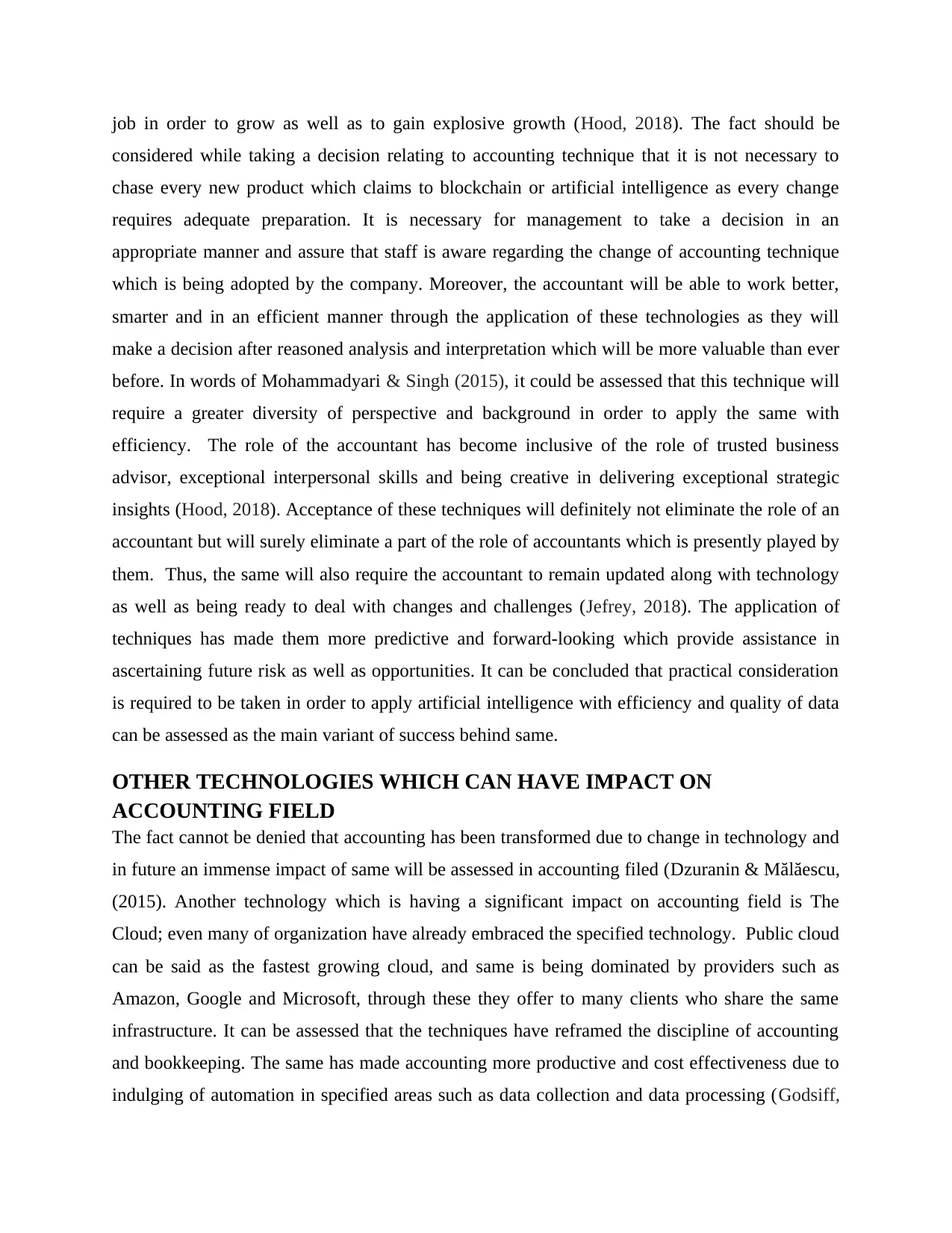
job in order to grow as well as to gain explosive growth (Hood, 2018). The fact should be
considered while taking a decision relating to accounting technique that it is not necessary to
chase every new product which claims to blockchain or artificial intelligence as every change
requires adequate preparation. It is necessary for management to take a decision in an
appropriate manner and assure that staff is aware regarding the change of accounting technique
which is being adopted by the company. Moreover, the accountant will be able to work better,
smarter and in an efficient manner through the application of these technologies as they will
make a decision after reasoned analysis and interpretation which will be more valuable than ever
before. In words of Mohammadyari & Singh (2015), it could be assessed that this technique will
require a greater diversity of perspective and background in order to apply the same with
efficiency. The role of the accountant has become inclusive of the role of trusted business
advisor, exceptional interpersonal skills and being creative in delivering exceptional strategic
insights (Hood, 2018). Acceptance of these techniques will definitely not eliminate the role of an
accountant but will surely eliminate a part of the role of accountants which is presently played by
them. Thus, the same will also require the accountant to remain updated along with technology
as well as being ready to deal with changes and challenges (Jefrey, 2018). The application of
techniques has made them more predictive and forward-looking which provide assistance in
ascertaining future risk as well as opportunities. It can be concluded that practical consideration
is required to be taken in order to apply artificial intelligence with efficiency and quality of data
can be assessed as the main variant of success behind same.
OTHER TECHNOLOGIES WHICH CAN HAVE IMPACT ON
ACCOUNTING FIELD
The fact cannot be denied that accounting has been transformed due to change in technology and
in future an immense impact of same will be assessed in accounting filed (Dzuranin & Mălăescu,
(2015). Another technology which is having a significant impact on accounting field is The
Cloud; even many of organization have already embraced the specified technology. Public cloud
can be said as the fastest growing cloud, and same is being dominated by providers such as
Amazon, Google and Microsoft, through these they offer to many clients who share the same
infrastructure. It can be assessed that the techniques have reframed the discipline of accounting
and bookkeeping. The same has made accounting more productive and cost effectiveness due to
indulging of automation in specified areas such as data collection and data processing (Godsiff,
considered while taking a decision relating to accounting technique that it is not necessary to
chase every new product which claims to blockchain or artificial intelligence as every change
requires adequate preparation. It is necessary for management to take a decision in an
appropriate manner and assure that staff is aware regarding the change of accounting technique
which is being adopted by the company. Moreover, the accountant will be able to work better,
smarter and in an efficient manner through the application of these technologies as they will
make a decision after reasoned analysis and interpretation which will be more valuable than ever
before. In words of Mohammadyari & Singh (2015), it could be assessed that this technique will
require a greater diversity of perspective and background in order to apply the same with
efficiency. The role of the accountant has become inclusive of the role of trusted business
advisor, exceptional interpersonal skills and being creative in delivering exceptional strategic
insights (Hood, 2018). Acceptance of these techniques will definitely not eliminate the role of an
accountant but will surely eliminate a part of the role of accountants which is presently played by
them. Thus, the same will also require the accountant to remain updated along with technology
as well as being ready to deal with changes and challenges (Jefrey, 2018). The application of
techniques has made them more predictive and forward-looking which provide assistance in
ascertaining future risk as well as opportunities. It can be concluded that practical consideration
is required to be taken in order to apply artificial intelligence with efficiency and quality of data
can be assessed as the main variant of success behind same.
OTHER TECHNOLOGIES WHICH CAN HAVE IMPACT ON
ACCOUNTING FIELD
The fact cannot be denied that accounting has been transformed due to change in technology and
in future an immense impact of same will be assessed in accounting filed (Dzuranin & Mălăescu,
(2015). Another technology which is having a significant impact on accounting field is The
Cloud; even many of organization have already embraced the specified technology. Public cloud
can be said as the fastest growing cloud, and same is being dominated by providers such as
Amazon, Google and Microsoft, through these they offer to many clients who share the same
infrastructure. It can be assessed that the techniques have reframed the discipline of accounting
and bookkeeping. The same has made accounting more productive and cost effectiveness due to
indulging of automation in specified areas such as data collection and data processing (Godsiff,
⊘ This is a preview!⊘
Do you want full access?
Subscribe today to unlock all pages.

Trusted by 1+ million students worldwide
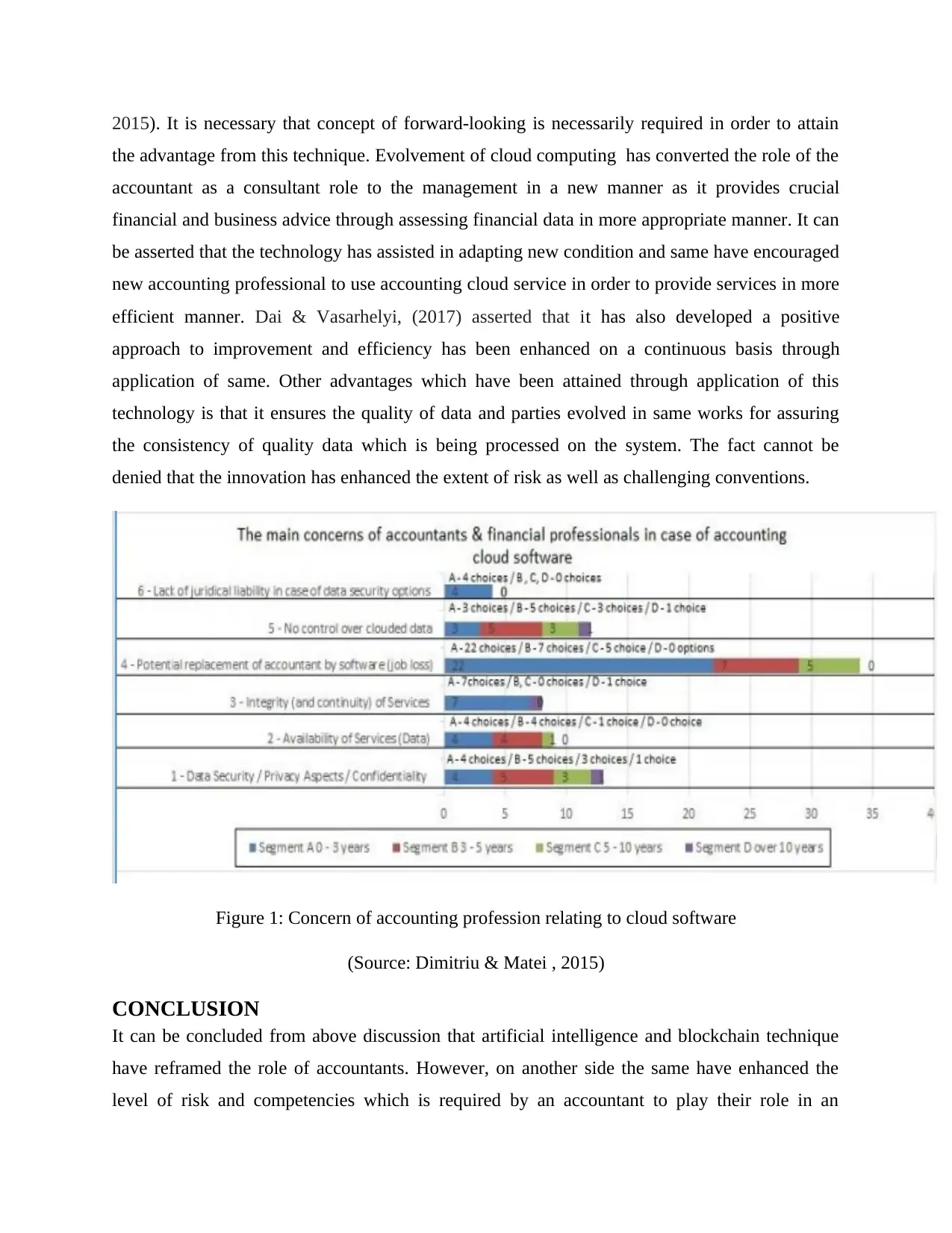
2015). It is necessary that concept of forward-looking is necessarily required in order to attain
the advantage from this technique. Evolvement of cloud computing has converted the role of the
accountant as a consultant role to the management in a new manner as it provides crucial
financial and business advice through assessing financial data in more appropriate manner. It can
be asserted that the technology has assisted in adapting new condition and same have encouraged
new accounting professional to use accounting cloud service in order to provide services in more
efficient manner. Dai & Vasarhelyi, (2017) asserted that it has also developed a positive
approach to improvement and efficiency has been enhanced on a continuous basis through
application of same. Other advantages which have been attained through application of this
technology is that it ensures the quality of data and parties evolved in same works for assuring
the consistency of quality data which is being processed on the system. The fact cannot be
denied that the innovation has enhanced the extent of risk as well as challenging conventions.
Figure 1: Concern of accounting profession relating to cloud software
(Source: Dimitriu & Matei , 2015)
CONCLUSION
It can be concluded from above discussion that artificial intelligence and blockchain technique
have reframed the role of accountants. However, on another side the same have enhanced the
level of risk and competencies which is required by an accountant to play their role in an
the advantage from this technique. Evolvement of cloud computing has converted the role of the
accountant as a consultant role to the management in a new manner as it provides crucial
financial and business advice through assessing financial data in more appropriate manner. It can
be asserted that the technology has assisted in adapting new condition and same have encouraged
new accounting professional to use accounting cloud service in order to provide services in more
efficient manner. Dai & Vasarhelyi, (2017) asserted that it has also developed a positive
approach to improvement and efficiency has been enhanced on a continuous basis through
application of same. Other advantages which have been attained through application of this
technology is that it ensures the quality of data and parties evolved in same works for assuring
the consistency of quality data which is being processed on the system. The fact cannot be
denied that the innovation has enhanced the extent of risk as well as challenging conventions.
Figure 1: Concern of accounting profession relating to cloud software
(Source: Dimitriu & Matei , 2015)
CONCLUSION
It can be concluded from above discussion that artificial intelligence and blockchain technique
have reframed the role of accountants. However, on another side the same have enhanced the
level of risk and competencies which is required by an accountant to play their role in an
Paraphrase This Document
Need a fresh take? Get an instant paraphrase of this document with our AI Paraphraser
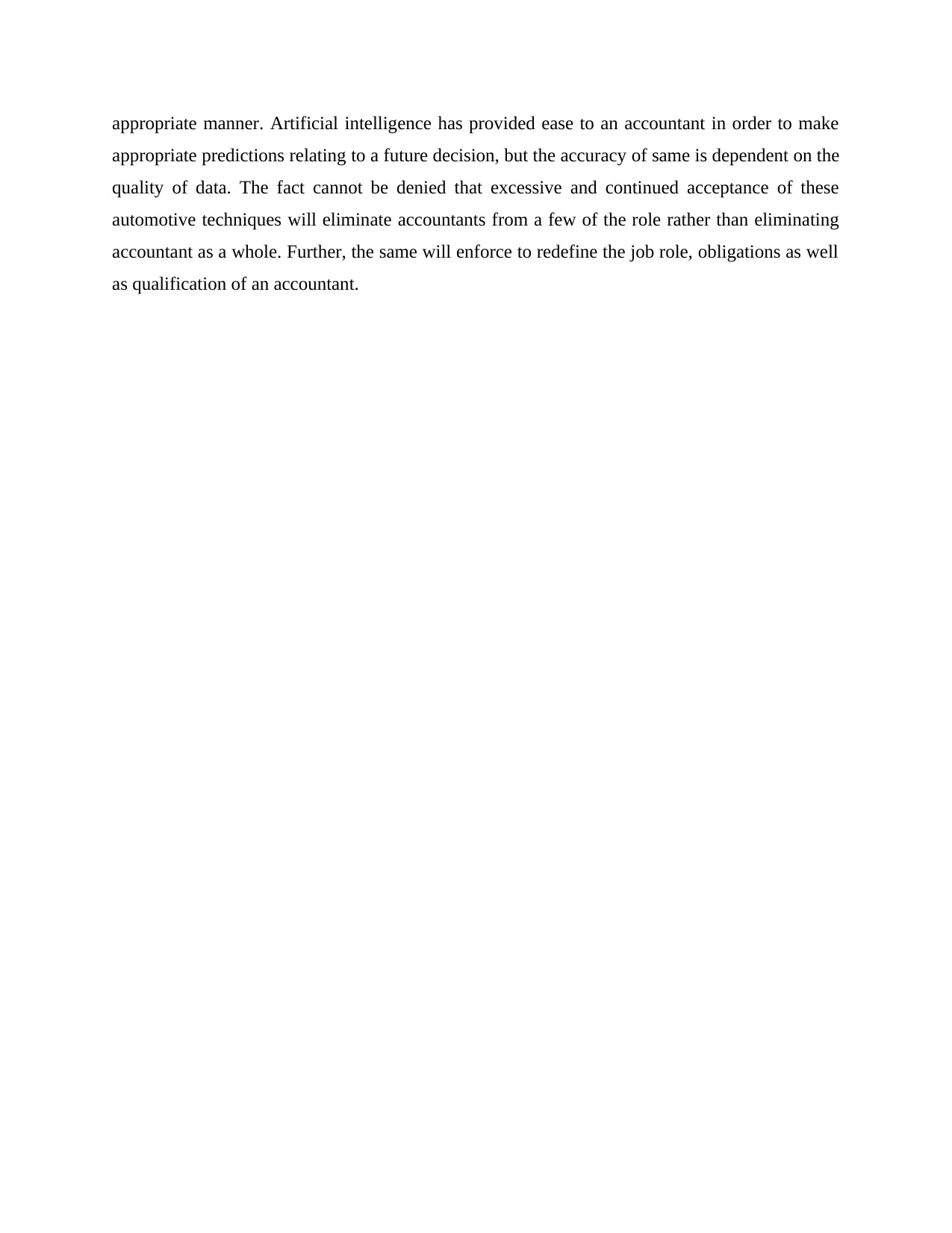
appropriate manner. Artificial intelligence has provided ease to an accountant in order to make
appropriate predictions relating to a future decision, but the accuracy of same is dependent on the
quality of data. The fact cannot be denied that excessive and continued acceptance of these
automotive techniques will eliminate accountants from a few of the role rather than eliminating
accountant as a whole. Further, the same will enforce to redefine the job role, obligations as well
as qualification of an accountant.
appropriate predictions relating to a future decision, but the accuracy of same is dependent on the
quality of data. The fact cannot be denied that excessive and continued acceptance of these
automotive techniques will eliminate accountants from a few of the role rather than eliminating
accountant as a whole. Further, the same will enforce to redefine the job role, obligations as well
as qualification of an accountant.
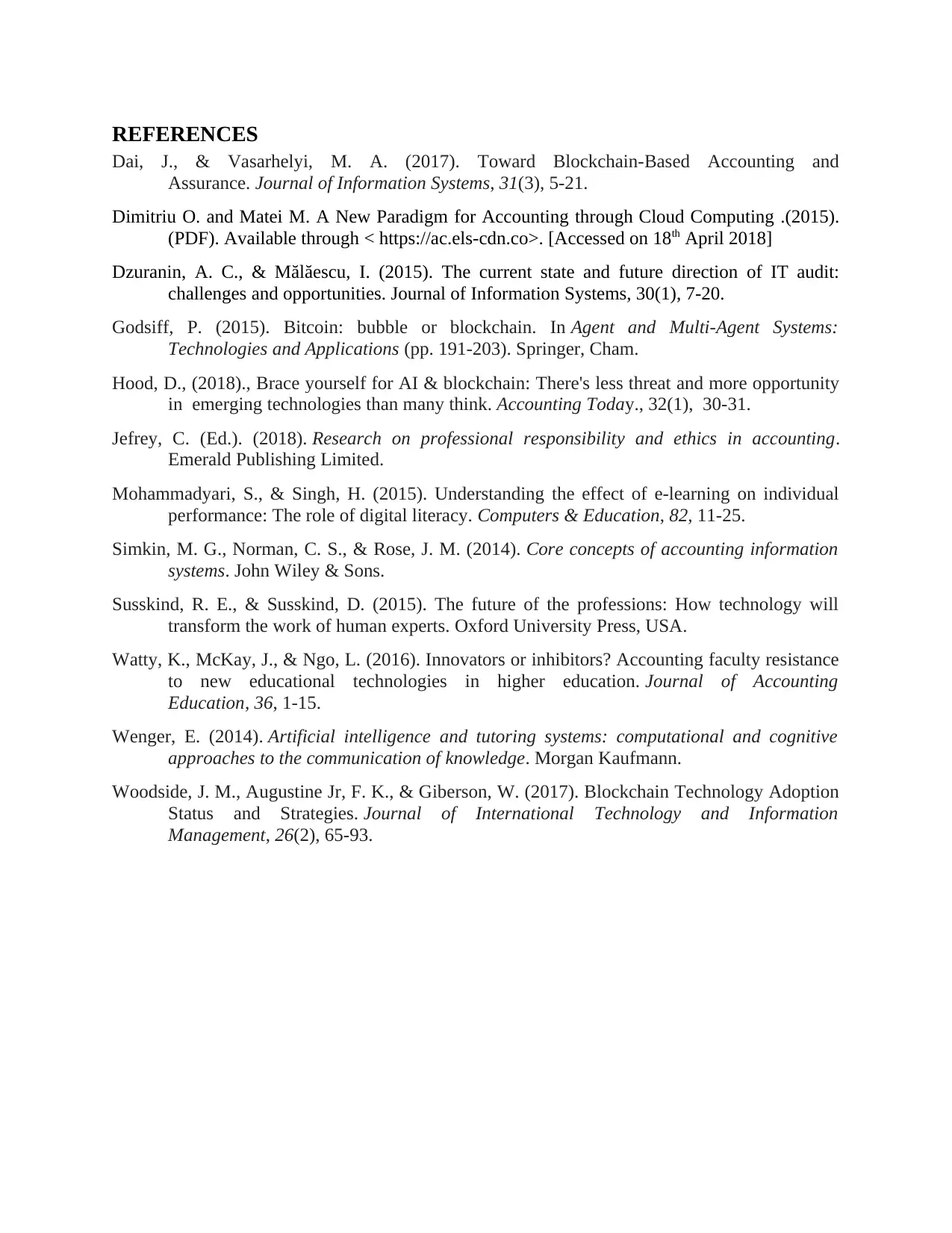
REFERENCES
Dai, J., & Vasarhelyi, M. A. (2017). Toward Blockchain-Based Accounting and
Assurance. Journal of Information Systems, 31(3), 5-21.
Dimitriu O. and Matei M. A New Paradigm for Accounting through Cloud Computing .(2015).
(PDF). Available through < https://ac.els-cdn.co>. [Accessed on 18th April 2018]
Dzuranin, A. C., & Mălăescu, I. (2015). The current state and future direction of IT audit:
challenges and opportunities. Journal of Information Systems, 30(1), 7-20.
Godsiff, P. (2015). Bitcoin: bubble or blockchain. In Agent and Multi-Agent Systems:
Technologies and Applications (pp. 191-203). Springer, Cham.
Hood, D., (2018)., Brace yourself for AI & blockchain: There's less threat and more opportunity
in emerging technologies than many think. Accounting Today., 32(1), 30-31.
Jefrey, C. (Ed.). (2018). Research on professional responsibility and ethics in accounting.
Emerald Publishing Limited.
Mohammadyari, S., & Singh, H. (2015). Understanding the effect of e-learning on individual
performance: The role of digital literacy. Computers & Education, 82, 11-25.
Simkin, M. G., Norman, C. S., & Rose, J. M. (2014). Core concepts of accounting information
systems. John Wiley & Sons.
Susskind, R. E., & Susskind, D. (2015). The future of the professions: How technology will
transform the work of human experts. Oxford University Press, USA.
Watty, K., McKay, J., & Ngo, L. (2016). Innovators or inhibitors? Accounting faculty resistance
to new educational technologies in higher education. Journal of Accounting
Education, 36, 1-15.
Wenger, E. (2014). Artificial intelligence and tutoring systems: computational and cognitive
approaches to the communication of knowledge. Morgan Kaufmann.
Woodside, J. M., Augustine Jr, F. K., & Giberson, W. (2017). Blockchain Technology Adoption
Status and Strategies. Journal of International Technology and Information
Management, 26(2), 65-93.
Dai, J., & Vasarhelyi, M. A. (2017). Toward Blockchain-Based Accounting and
Assurance. Journal of Information Systems, 31(3), 5-21.
Dimitriu O. and Matei M. A New Paradigm for Accounting through Cloud Computing .(2015).
(PDF). Available through < https://ac.els-cdn.co>. [Accessed on 18th April 2018]
Dzuranin, A. C., & Mălăescu, I. (2015). The current state and future direction of IT audit:
challenges and opportunities. Journal of Information Systems, 30(1), 7-20.
Godsiff, P. (2015). Bitcoin: bubble or blockchain. In Agent and Multi-Agent Systems:
Technologies and Applications (pp. 191-203). Springer, Cham.
Hood, D., (2018)., Brace yourself for AI & blockchain: There's less threat and more opportunity
in emerging technologies than many think. Accounting Today., 32(1), 30-31.
Jefrey, C. (Ed.). (2018). Research on professional responsibility and ethics in accounting.
Emerald Publishing Limited.
Mohammadyari, S., & Singh, H. (2015). Understanding the effect of e-learning on individual
performance: The role of digital literacy. Computers & Education, 82, 11-25.
Simkin, M. G., Norman, C. S., & Rose, J. M. (2014). Core concepts of accounting information
systems. John Wiley & Sons.
Susskind, R. E., & Susskind, D. (2015). The future of the professions: How technology will
transform the work of human experts. Oxford University Press, USA.
Watty, K., McKay, J., & Ngo, L. (2016). Innovators or inhibitors? Accounting faculty resistance
to new educational technologies in higher education. Journal of Accounting
Education, 36, 1-15.
Wenger, E. (2014). Artificial intelligence and tutoring systems: computational and cognitive
approaches to the communication of knowledge. Morgan Kaufmann.
Woodside, J. M., Augustine Jr, F. K., & Giberson, W. (2017). Blockchain Technology Adoption
Status and Strategies. Journal of International Technology and Information
Management, 26(2), 65-93.
⊘ This is a preview!⊘
Do you want full access?
Subscribe today to unlock all pages.

Trusted by 1+ million students worldwide
1 out of 9
Related Documents
Your All-in-One AI-Powered Toolkit for Academic Success.
+13062052269
info@desklib.com
Available 24*7 on WhatsApp / Email
![[object Object]](/_next/static/media/star-bottom.7253800d.svg)
Unlock your academic potential
Copyright © 2020–2025 A2Z Services. All Rights Reserved. Developed and managed by ZUCOL.


